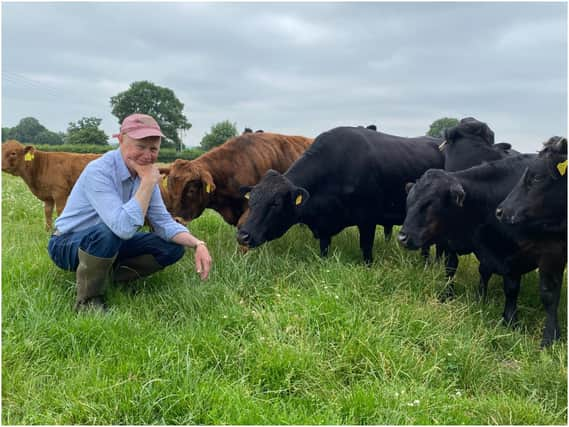South Warwickshire rare breed cattle used in a national research project


A Warwickshire herd of rare breed Dexter cattle has been used in a two-year research project into the nutritional benefits of meat from cattle fed only on grass.
The research, which included detailed analysis of sirloin meat taken from six animals in the herd near Barford, where Dr Malcolm Eykyn has been breeding Dexter cattle for 20 years, found it contained vital minerals, vitamins and fats essential for a balanced human diet.
Advertisement
Hide AdAdvertisement
Hide AdThe two-year project was carried out by post-doctoral research scientist Dr Sarah Morgan, under the direction of Professor Michael Lee, one of the acknowledged global leaders in grass-only fed ruminant research, based at the world’s oldest and largest agricultural research institute Rothamsted Research, at their North Wyke campus situated near Okehampton, Devon.
Dr Morgan, whose results will be fully unveiled at a meeting of the Dexter Cattle Society in Warwickshire on July 11, said red meat was an important dietary source of many essential minerals, including iron, zinc and selenium; vitamins, such as B12, which we need to make blood; and mono-unsaturated fats, polyunsaturated fats and omega-3 and omega-6 fatty acids.
“There is increasing demand for pasture-fed meat and milk, which are considered to be healthier than grain-fed meat and milk, due to their higher unsaturated fat and omega-3 fatty acid content,” she said.
Dr Morgan explained that “Omega-3 and omega-6 fatty acids make up the tissues in our body, particularly in the brain and nervous system, and are a vital part of many processes within the body including immune function”.
Advertisement
Hide AdAdvertisement
Hide AdShe said: “Humans can only obtain these essential nutrients through food consumed as part of their diet. The analysis showed that Dexter beef reared on grass-based diets contained more unsaturated fats compared to saturated fats and had high levels of health-beneficial omega-3 fatty acids and conjugated linoleic acids.
“The results also showed that grass-fed Dexter beef had high levels of Iron, Potassium, Phosphorus and Zinc, which are more readily absorbed by the body compared to plant-based sources”
Dr Eykyn said: “We are what we eat and humans can’t get all they need from plants; meat is essential to the human diet. According to scientists, we only need 70 gms (about 2.5 ozs) of meat a day, no more than that”
“We need to redesign agriculture and food to reduce carbon and to be sustainable. Grazing cattle put carbon back into the soil through manurials.”